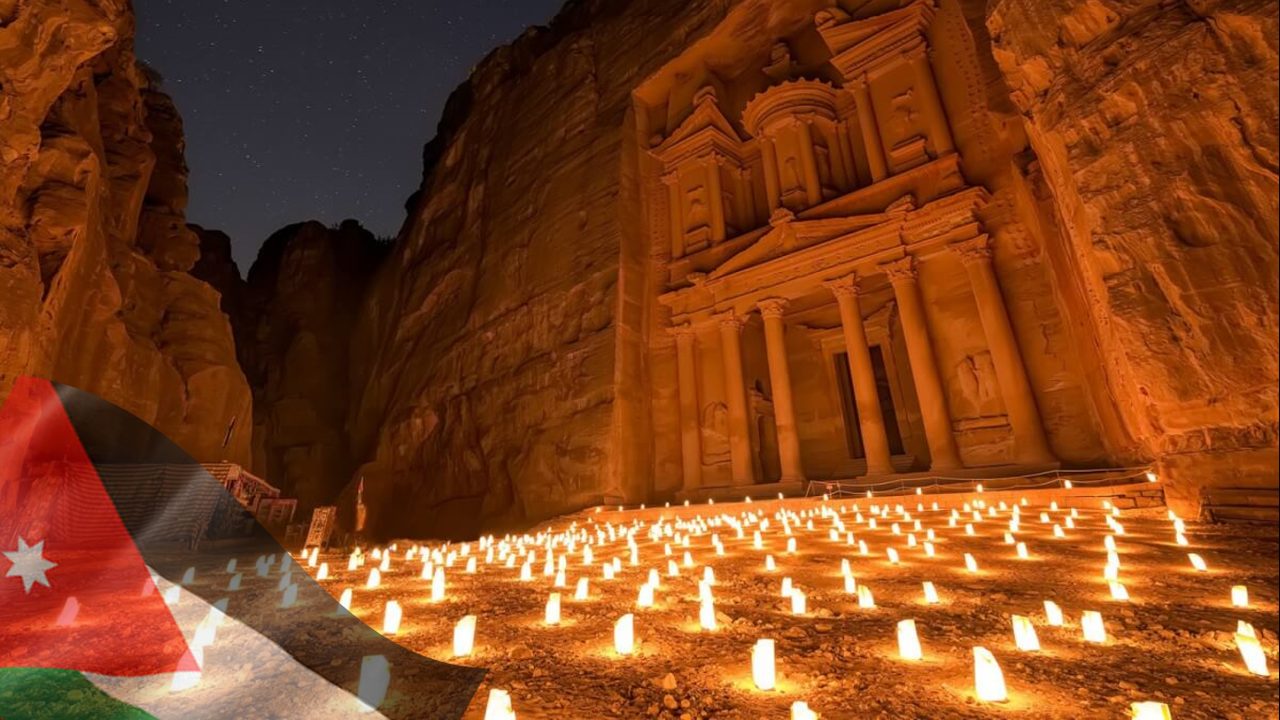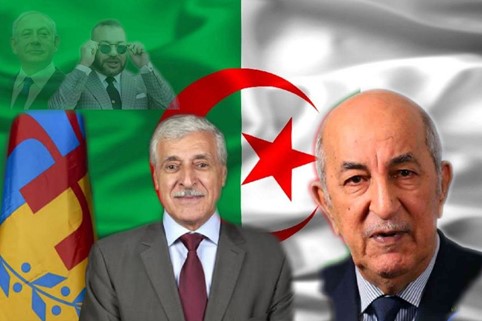In late January this year French President Macron invited Algeria to the Europe-Africa Summit soon to be held in Brussels. That might appear insignificant, but that in fact the gesture aims to out an end to months of heated turmoil between Paris and Algiers. A struggle that broke at out at the same time, when Algeria was in the brink to go to war with Morocco.
Much of this turmoil is caused by remarks, French offenses, which Algeria much deeper than expected. Because it revealed contradictions within the national identity. Which is a problem all over North Africa, and a source of a number of struggles.
That is why Algeria, already in an internal crisis, reacted furiously. Because the remarks opened a long concealed debate about the components national identity in North Africa, contradictions between the colonial past, Arabic-Islamic cultural influence and the Berber ancestry. The latter is playing more role, and already nurtured alarming movements. Movements, which might put the fate of these countries to question, and not necessarily in the distant future.
Arabism and Islamism. The two go hand in hand?
Early Islamic conquests all over the area, which is now identified as Muslim Middle East is usually regarded as a swift and decisive transformation from all previous cultural and religious identities to one coherent vision. As if the whole Middle East within a century or so transformed to one Arab Islamic new cultural landscape, which regardless its local specifics is a largely coherent new image. That is, however, largely due to our modern concepts about the Middle East. Also largely disregarding the huge differences even within the Arab world itself. In which not only religious-sectarian differences play a role, like the differences between Sunnis and Shiites, or between fundamentalist and modernist, but also cultural differences. The role of the former cultural, which were present and still play a role today.
It would be hard to deny the role of cultural heritage of Egypt long predating Islam still being an integral part of today’s Egyptian identity, and not only among Christians. The same is true in almost all Arab countries from Iraq to Morocco, which coexist with and complement the role of Arab language and Islamic religion in the national identity.
The transformation after the Islamic conquest meant several phenomenons coinciding, but with very different results in different parts of the new Islamic Empire. Iran is a best example, where Islam and the strong influence of the Arabic language eventually did not replace Persian identity re-emerging centuries later with a distinct blend of Islam. So when we look into the effects of the Islamic conquest to some extent we have to separate two different, but coexisting trends. That of Islamism and that of Arabism. One means the gradual conversion to Islam by the majority of the population, while the other means the adoption of Arabic language, costumes and values. While the Arab East largely due to its former Semitic cultural background being close to the Arab world rapidly adopted the Arabic language and customs, the religious conversion by the majority took centuries. Here Islamism was never complete. That is why we find large Christian communities in the Arab East up to the twentieth century.
The Arab West, North Africa, however, showed a different pattern, where conversion to Islam was almost instant and practically absolute, yet Arabism was very slow and struggled to surpass the former strong Berber identity. For the four century after the Islamic conquest North Africa showed a special cultural identity, the Moor culture, where the elite adopted Arab, as a high language – like Latin in Medieval Europe -, but Berber culture and values stayed significant. Berber dynasties ruled in the name of Islam largely based on fragile alliances between different Berber tribes. It was only due to the so called Banī Hilāl invasion in the middle of the eleventh century, which brought large number of Arabs to North Africa for the first time. And since that brought large scale devastation, Arabism always had a questionable reputation. Because of this largely Berber cultural landscape it is not a coincidence that North Africa was a fertile ground for Shiī tendencies trying to form a unique identity.
This already different cultural landscape was further formed by Turkish influence, and later by the Spanish and later French invasions. This cultural identity being very different from the Arab East is the reason, why after the French colonization the newly independent countries had a hard time to completely build on Arab identity in contrast to a Western-French one, as it was not universal, and rather they built on an Islamic identity. Because that was universal, above the cultural and linguistic barriers. That is why we see massive attempts in all North African countries after independence to build an Arab identity making them coherent part of the Arab world, as a tool for unification and uniformity. Which by the twenty-first century showed signs of failure, as first Morocco, and soon after Algeria accepted Berber languages – mostly Tamazigh – as official languages.
The reason for this that large parts both in Algeria and Morocco stayed only lightly Arabized, and kept a strong Berber linguistic and cultural identity. The same is true to Tunisia and Libya as well, but to a much lesser extent.
That is a rich cultural background, but one that can form problems for the new states trying to build distinct national identities. Became the barriers between Arabism, Berberism and French influences all playing a role and raising questions. And that dilemma is met with an other the question of the borders.
The borders of North Africa
It is frequently debated topic, how much the borders of the Arab world are historic, realistic, or even sustainable. That is not unfounded, as many of the borders were carved by the colonizing powers, Britain and France after the First World War. And indeed the viability and historic reality of such countries as Jordan, Palestine, Kuwait or Lebanon can be hot topics, as little divide them from some of their neighbors. That is why many countries of the Arab East had a specifically hard time to formulate a national identity after independence, though in most cases by now this was largely successful.
This general view is many times applied to the Arab West as well. But here the picture is very different. While the borders between Morocco, Algeria, Tunisia and Libya shifted along the centuries by the Middle Ages these were distinct political units. Despite their closeness they grow into separate states and the borders between themselves were largely clear. But the largely fixed boundaries between these units meant the coastal, more densely populated areas, not the huge desert of the Sahara. The vast, but scarcely populated desert areas in the Sahara since the Islamic conquest was ruled by the local, largely Berber tribes mostly undisturbed by the events of the coast. Between the Moroccan Atlas and the Tunisian coast there were no real borders in the deep desert, and they would have had little meaning. That is until the French colonization, which kept moving further into this barren landscape. And since Algeria became an integral part for France after 1871, unlike Tunisia and Morocco being “only” protectorates, it was only “natural” that France kept expanding Algeria in the desert to the expanse of its neighbors.
After all these states gained their independence it was not surprising to see that these states had grievances against each other, exactly along these desert borders, which were small in population, but in many cases rich in natural resources. Algeria and Morocco even fought a brief war after Algeria’s independence, the so called Sand war along their northern desert borders, which is still a matter of disputes.
One area, however, caused a special problem. That is what we today commonly refer to as Western Sahara. Unlike Morocco – apart from its northernmost tip -, Algeria, and Tunisia, this part of the world was a Spanish position until 1975. And since by the time Spain left this former position Morocco and Algeria were independent states with enough tension between them a rivalry started, which lasts to our very day. Algeria held the position that the area should be independent – under Algerian influence -, while Morocco citing historical claims perceived it as its own territory, to where it moved in. Algeria strongly supported the political front fighting for independence, the basis of the Polisario Movement, and it still does it today. Morocco on the other hand spent large efforts and funds to incorporate this vast area. And here we see a long dispute between the two countries, apart from all other considerations, which kept escalating and subsiding, depending on the actual realities. Whenever the relations between Algiers and Rabat headed for the better, the matter of Western Sahara kept subsiding, yet whenever tension started to grow Western Sahara flared up. The last few years are no exception in this regard.
That all might seem as long and oversimplified historical backstory, but only trough the understanding of this complexity can we see the problem recently spiraling out between Morocco and Algeria. Because for long Algeria in all its disputes with Morocco could play on the Western Saharan card, as it meant divisions within Moroccan identity. It could have been portrayed, for right or wrong that Morocco is not united, at least not with Western Sahara, while Algeria had no such problems.
The recent developments between the two states are alarming, because changes appeared in this paradigm. Morocco managed to gain Arab and international recognition for Western Sahara, against which Algeria has no antidote, while at the same time cracks started to appear within the Algerian national identity. Algiers portrays that the two trends are connected. And it is not completely unfounded.
What is the MAK?
Recently news are popping up that Algeria is fighting a terrorist organization called MAK. An organization mostly obscure for the Western audience. But what is that infamous MAK about we hear more and more in the Algerian news, as if it was an equally menacing terrorist organization as the al-Qā’ida, or Dā‘iš? The Algerian state news clearly seek to draw a parallel between this organization the more famous radical Islamist groups.
The MAK has a substantial past on a number of forms, though the current name and structure is relatively new, only going back to 2001. That was the time when after the strong Arabization attempts of the ‘60s and the ‘70s were slowly lifted, or eased, but also a time fundamental political transformation after the bloody ‘90s of the civil disturbances. With the ascendence of President ‘Abd al-‘Azīz Bū Taflīqa in 1999 there was an atmosphere of change after the civil war and a hope that the military distances itself from being directly involved in daily politics. A new power was forming, which was a fertile ground for a number of political formations and movements, including those advocating minority rights. That is how Amazigh movements started to gain momentum, and not even primarily in the south, but in the more densely populated north in areas having strong Berber identity. One of these, probably the most distinct in identity is region of Kabaliya, home of one of the Berbers peoples, the Kabila.
During April 2001 protests and later on sporadic clashes broke out in the mountainous heartland of Kabaliya, and the clashes lasted for almost a year, until central authorities managed to regain full control. Yet that left some 100-150 victims behind – numbers are heavily disputed – and in some remote areas practically self governing regional authorities were created. This event is usually referred to as the “Black Spring”, which was the first major warning sign in the history of modern Algeria that Arabization attempts were not successful and even backfired.
That is the time when MAK was formed as one of the political groups fighting the central authority and went through a number of name changes. It was originally known – in Arabic – as Ḥarakat Istiqlāl al-Qabā’il, Movement of Kabilas’ Independence, only to change its name soon to Ḥarakat Taqrīr al-Maṣīr li-Minṭaqat al-Qabā’il, Movement for the self-determination of Kabila region. In 2013 the official name of the organization was changed once again to Movement for Autonomy of Kabiliya. These name changes somewhat reflecting the lack of progress shows how the main aim changed from independence to wide ranged autonomy. Here it should be pointed out that while Kabaliya region is a mountainous and hardly accessible area, it is not a border region, but a central one relatively close to the capital with it center in the city of Tīzī Wīzū.
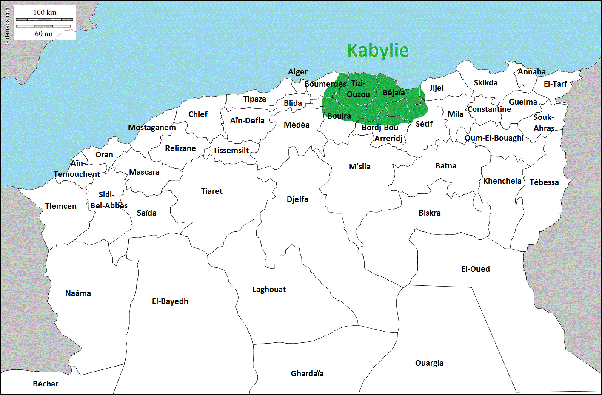
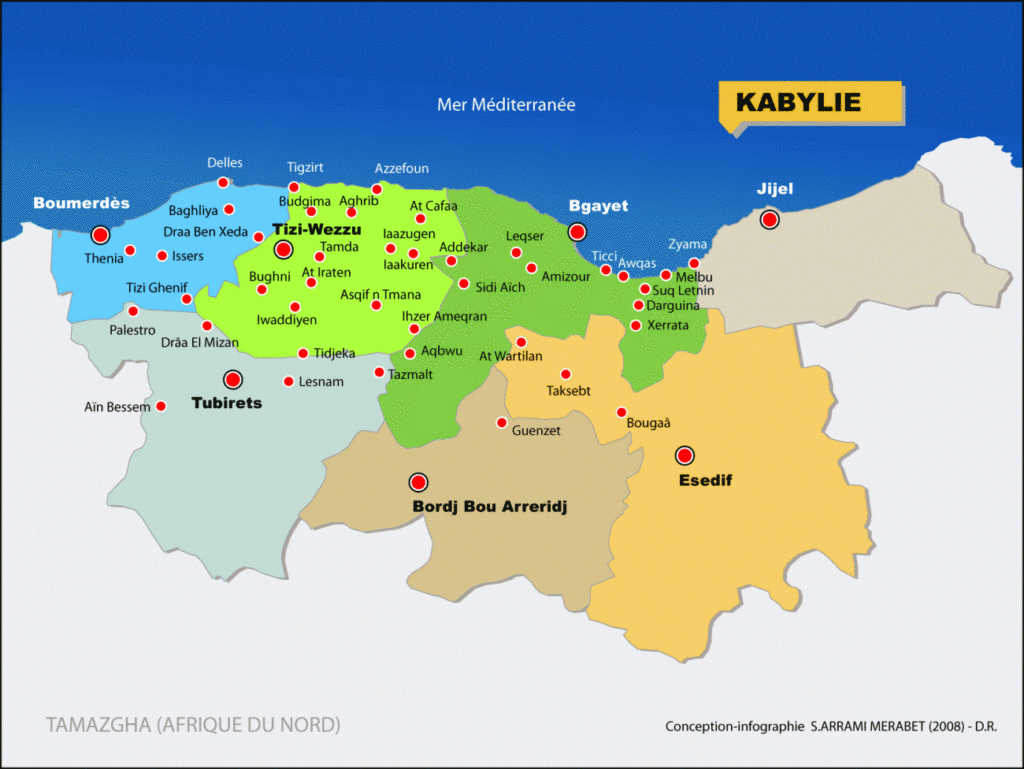
Also noticeable that the matter of Berberism is far from an easy one in Algeria. Though Kabaliya region is the most distinct Berber area, it only represents about a third or fourth of all Berbers in Algeria, many of them being linguistically different from the Kabilas. Also, a large number of Berbers, including leading politicians see no contradiction between common Algerian identity based on a joint Arab-Berber cultural heritage and Berber ethnicity. And there is a number of clearly Berber parties – though mostly smaller ones – being part of the general political structure. So MAK, or other radically independence advocating formations cannot count on all Berbers of the Algeria.
From the beginning the leader of MAK, which initially organized protests and political rallies, was a Kabila singer named Farḥat Mahannī, or by his Berber name Farḥat Imazighen Imula. He has been ruling over this shady organization with a tight control until this day, though for long in exile in France. He was a somewhat know singer, and like many at that time joined a movement of cultural-political advocacy for Berberism, being not so directly at clash with the authorities, but with the most radical Islamists. And this points to another phenomenon, a clear cultural war in this formerly staunchly socialist country between the growing religious and local cultural sentiments.
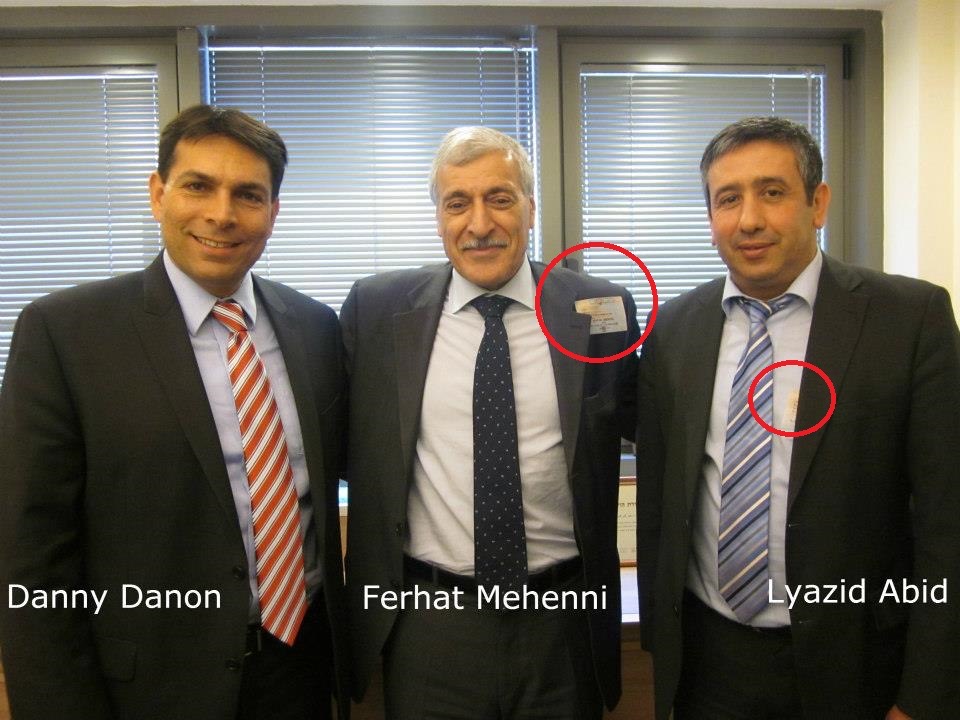
After 2002 Mahannī left Algeria and led an active political campaign, which slowly phased out and the MAK became a lesser known marginal group, a dying memento of the Black Spring. That is until 2021, when Algeria declared MAK – along with another non-Berber movement called Rašād – a terrorist organization and asked international organizations to confront it. This happened after a number of incidents and unclear terrorist attempts allegedly organized by MAK. This came in a time of general political instability after the fall of Bū Taflīqa and the slow transformation, which is still lasting. Since this step the number of news attributing clandestine activities to MAK started to rise in the Algerian news.
If the MAK was founded in 2001 why was it declared a terrorist organization only in 2021 and why is the surging interest by the government for it? That is due to a number of factors. After a long relative silence the MAK started to re-emerge sometime around 2015 after the general instability following the so called Arab Spring. It was in 2015 when the first reports from a former leading MAK member, Idīr Ğūdar (Idir Djouder) claiming Morocco started to finance MAK and Mahannī directly in an attempt to destabilize Algeria, or at least to have a card against it in the long disputes about Western Sahara. And in later years similar claims kept resurfacing in the Algerian state press which were mostly regarded as part of the general phobia in Algerian state circles about Morocco. Yet what gave some credibility to this claim was the fact that news even before kept emerging that after the Arab Spring the MAK resurfaced and is looking for international supporters. In 2012 it was reported that Mahannī met with Israeli officials in Israel, sought support and even suggested former recognition for Israel by a future Kabila state. This was confirmed at the time by the Israeli press. This is a very sensitive topic in Algeria, as the state always expressed strong support for Palestine and has a hard line on the subject.
As long as MAK was a practically insignificant movement these news, alarming as they were meant little importance. Algeria got through the Arab Spring with little to no difficulty and the matter somewhat subsided. Since then, however, three key factors changed.
After the fall of President Bū Taflīqa and the relative instability for the old elite, which is still trying to regain control along the old practices the government of President Tabbūn is facing a number of difficulties. There is a vicious inner struggle within the military elite, which is matched with massive economic and therefore social problems. Since that is fueling the political problems, the government understandably tries to look for enemies to rally popular support against them. Also in 2020 Morocco normalized its relations with Israel, and in 2021 signed a security agreement with it, which suddenly brought Israeli presence to its borders. But also within the normalization process Washington and a number of Gulf states recognized Western Sahara as an integral part of Morocco. Which is a game changer in the history gamble of Algeria. All these struggles are suddenly met at the same point. The idea of Moroccan-Israeli machinations trying to hit Algeria, right at a time of internal weakness. And recently a number of claims and remarks both by Morocco and France aggravated these fears, as they suspiciously echo the same idea.
The problem presented by MAK is far larger than it seems, or as the Algerian state officially acknowledges it. Not because there would be any substantial evidence that MAK would be a vast organization, or that Morocco indeed supports it. The problem is that the very presence of MAK means a threat to the fabric of the Algerian national identity. For long Algeria was claiming the right of self determination for any nation both in Western Sahara and in Palestine, not having fears that this could ever backfire. Now it seems it can. This can attract support even within Algeria, not only in Kabaliya and can envision internal war. So far Algiers even benefits from the claims that Morocco and Israel would be behind MAK, as general sentiment is against both. So at the moment MAK can be portrayed as a treacherous foreign group, not a representative of an existing problem of identity. Yet with the growing economic problems the tension is growing and in recent months there has been massive rallies in Tīzī Wīzū, some demanding the “expulsion of Arabs”.
But even if these sentiments do not spread beyond Kabaliya there is a growing frustration in this area against Arab identity, language and the central state authority. And this has already attracted an equally vocal response, mostly from the most hardline Islamist circles seeing in this a mixture of French, Western, Christian anti-Muslim attempts to break up Algeria. Altogether this is a very toxic combination, which is not heading for solution, and even the latest government attempts to ease the tension by expanding Amazigh language usage does not seem to be enough.
Scandalous insolence
This dangerous setup last year entered the realm of international politics on two separate ways, though probably these are not seen so separate in Algiers.
After Morocco gained an edge in the Western Sahara matter in 2020 the tension with Algeria gradually grew. Algeria had little response to this. Though losing the Western Sahara card is not necessarily crucial, but seeing Israel securing a foothold in the neighboring country is a real problem. So the unofficial, but very real response was to heat up the conflict between the Polisario and Rabat once again. The sporadic clashes at the border region between Western Sahara, Morocco proper and Algeria are growing. Both sides are blaming the other for this, but so far dislodging Morocco from its comfort hasn’t succeeded. This was met with claims that Morocco is supporting the MAK, which this led to heated remarks and finally closing the embassies (Magyar) in both countries in August 2021. A month later Algeria closed its airspace (Magyar) for Moroccan planes, both civilian and military. It also took steps to take revenge on economic terms, though with very little success. Though right now the situation does not suggest immediate war, the situation is tense, and worrisome if political turmoil would take over in Algeria.
On the other hand relation between Algeria and Francia at the same time became equally tense. It should be kept in mind that in April there will be presidential elections in France and President Macron has no reason to be optimistic. Great irony that one of his most vocal and likely opponent is of Algerian ancestry, Eric Zemmour. The well-known journalist and political activist Zemmour was born in France, but his parents were Berber Jews from Algeria. For long he was a vocal critic of Muslims in France and immigration, so counts to be a staunch enemy of Algeria. Yet he managed to capitalize on the growing anti-Muslim sentiment in France and became a likely candidate of the French right. In this light Macron cannot go easy with Algeria, especially when topics of French colonization, French interests in Africa, or the French history is challenged, which are popular political slogans in Algeria. Especially in times of turmoil.
Harsh remarks from both sides – as somewhat customary – kept going back and forth, until it spiraled out of control. In October 2021 – responding to reheated Algerian zeal about the colonial past – Macron raised the question: “Was there an Algerian nation before French colonization?” This is very sensitive topic in Algeria, and in light of our historical overview it can be understood why. Naturally, the Algerian leadership got outraged. It also closed it airspace, and though only for the military planes, this is a serious problem for France now engaged in Mali. Algiers also gave an unofficial green light to Russia to appear in Mali, securing support via Algeria. Algeria – though only briefly – recalled its ambassador and threatened to cut all diplomatic and economic ties, while was looking for expanded relations with Italy and Spain.
Algiers wanted an official apology – and thus a political victory – from Macron, who refused that. Yet in November 2021 somewhat backtracked in his remarks and in December French Foreign Minister Le Drian visited Algeria to defuse the tension. On 29 January 2022 Macron broke the ice and held a telephone conversation with President Tabbūn, inviting Algeria to the upcoming Europe-Africa Summit in Brussels. That is because regardless the historical grievances the two countries enjoy close relations and strongly need each other. Also, both leaderships fully aware that much of the turmoil is driven by political tactics at home.
So far the tension seems to subside, and surely will calm after the French elections, regardless who wins it. Yet the wounds these remarks by France and Morocco opened, especially almost at the same time, shows the problem. Not only Algeria, but the questions of identity all over North Africa.

